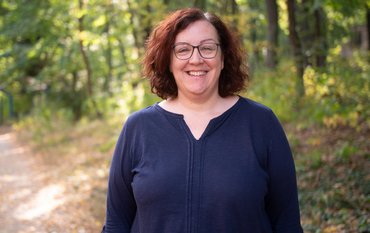GFZ researcher Priv. Doz. Dr. Sascha Brune receives the Consolidator Grant of the European Research Council (ERC) in the amount of 2 million euros for his research project EMERGE "Measuring and Modelling Tectonic CO₂ Emissions Through Time". The project uses drones and computer models to study CO₂ emissions during continental breakups.
Manja Schüle, Minister for Science, Research and Culture of the State of Brandenburg, congratulated Sascha Brune on the award: "The GFZ German Research Centre for Geosciences in Potsdam is delivering essential and leading-edge impulses for international geoscience, environmental and climate research. I am very pleased that the European Research Council perceives this in a similar way and has awarded GFZ researcher, Sascha Brune, one of this year's 'Consolidator Grants' — congratulations! With his research project, the geophysicist is creating the interpretative basis for CO₂ balances of our planet over half a billion years. Scientists like Sascha Brune show: Our research in Brandenburg, a state geared for the future, is excellent!”
About the project
Geological processes have caused large CO₂ fluctuations in the past and influenced the climate. In recent studies, massive CO₂ emissions have been detected at continental rifts. The EMERGE project links three innovative approaches to measure and model such CO₂ outgassing. First, Brune and his team are using drones to measure CO₂ fluxes at rifts in Kenya, Ethiopia, the Czech Republic, and Iceland. In addition, novel modeling techniques are being developed to investigate the controls of geodynamic processes on CO₂ transports in the lithosphere, the outermost layer of the Earth. A third approach is to integrate data from the last 540 million years of all known rifts worldwide. This will allow to understand the role of tectonic degassing in shaping Earth’s climate through time.
The project integrates interdisciplinary ideas and methods from geodynamics, micrometeorology, petrology, and paleoclimatology. Drone-based CO₂ flux measurements will be a game changer in the understanding of CO₂ release by tectonics from Earth's interior - at rifts and other plate boundaries worldwide. The methodological and scientific advances may be essential for accurately determining the controls of tectonic CO₂ outgassing on past and future climate change.
Sascha Brune studied Physics at Humboldt University Berlin and at Paul Sabatier University, Toulouse. He has been working at GFZ in the Geodynamic Modeling Section since 2006; in 2019 he took over the leadership of the section. Between 2013 and 2015, he spent two years as a PostDoc at the University of Sydney. Brune's previous work has focused on rift valleys, plate tectonics, the deep carbon cycle, and tsunamis, among other topics.
About the ERC
The European Research Council, established by the European Union in 2007, is the main European funding organization for excellent frontier research. The ERC is governed by an independent management board the scientific council. The ERC's total budget for the years 2021 to 2027 is more than 16 billion euros and is part of the Horizon Europe program. The ERC funds creative researchers of all nationalities and ages to carry out projects across Europe and offers four core funding programs: Starting Grants, Consolidator Grants, Advanced Grants and Synergy Grants. The Consolidator Grants support excellent, promising scientists seven to twelve years after their doctorate.














![[Translate to English:] [Translate to English:] Abror Gafurov von dem Schriftzug "Welcome to Azerbaijan" und den UN und COP Logos](/fileadmin/_processed_/2/5/csm_2024_11_Baku_COP29_Abror_Gafurov_1042faec82.jpeg)


![[Translate to English:] Martin Herold standing in front of the library on the Telegrafenberg](/fileadmin/_processed_/c/d/csm_Martin_Herold_d385ee4dd9.jpeg)
![[Translate to English:] Many people are listening to a presentation in the GFZ lecture hall.](/fileadmin/_processed_/c/a/csm_1_Bild1_hell_b9c0e9f5ed.jpeg)






![[Translate to English:] Both scientists sitting on stools in front of a wall of books in the Telegrafenberg library](/fileadmin/_processed_/6/6/csm_Buiter_Castell_DORA_4_e87cb1ea18.jpeg)
![[Translate to English:] Gruppenbild mit 4 Personen](/fileadmin/_processed_/8/d/csm_20241017_GFZ-Emmerman-Medal-005_web_reinhardtundsommer_21a414fa4a.jpeg)






![[Translate to English:] Ice landscape with five red tents](/fileadmin/_processed_/8/9/csm_Zeltlager_auf_dem_Eis_Urheberin_Jenine_McCutcheon_5ced2d523b.jpeg)


